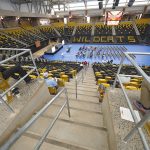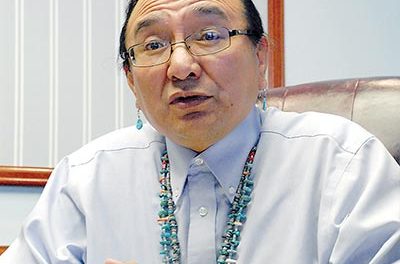
Superintendent responds to school board allegations
WINDOW ROCK
The Navajo Nation’s acting superintendent of schools said last week that the Department of Diné Education is not trying to take over the schools, reduce the number of school boards or change their policies.
These were allegations by a group representing U.S. Bureau of Indian Education grant school boards of education.
“I am disappointed in (the Diné bi Olta School Board Association’s) tactics for raising awareness around the Nation’s education efforts, as they needlessly serve to divide the many communities the Nation serves instead of unify them,” Acting Superintendent Patricia Gonnie wrote in an email to the Times, “but I am hopeful DBSOSBA will work more collaboratively with the Nation in the future.”
In litigation and interviews with the Times, DBOSBA President Ervin Chavez and Executive Director Jordan Etcitty had accused DODE of undermining local control of the Nation’s 60-plus BIE grant schools in an effort to consolidate control of the schools under DODE.
“The Department of Diné Education has no plans to ‘take over’ any grant schools,” Gonnie shot back. “Any allegation to the contrary is inaccurate.”
Furthermore, according to Gonnie, DODE has taken no position on the reapportionment of school boards recently approved by the Navajo Nation Council (and being challenged in court by DBOSBA).
“The only involvement the department had in the approval of the 2020 school board apportionment plan was assisting the Health, Education, and Human Services Committee with the school board apportionment planning process, data collection, and facilitation of public hearings at five different agencies,” Gonnie wrote.
She also said the department is “not aware of any changes to local school board polic(ies) as alleged by DBOSBA.” The department and Navajo Nation Board of Education have proposed changes to the stipend policies, which have yet to be approved by HEHSC, according to Gonnie, and have supplied a copy of the changes to DBOSBA.
“These changes were largely designed to prevent abuse of school funds and excessive school board travel for outgoing school board members, as this has been a persistent problem in the past,” she wrote. “Those policy changes were also designed to protect school employees charged with ensuring compliance from retaliation from school boards, which again has unfortunately been a recurring issue,” she said.
The only other proposed amendments are “minor clarifications and updates to the (BIE) grant application requirements … which have not been updated since 2001,” Gonnie wrote.
She also defended NNBOE President Priscilla Manuelito, who was the subject of a no-confidence vote by the New Mexico Navajo Central Agency School Boards. “She has done an excellent job of balancing the many challenging interests that have come up over the past year in the face of COVID-19, and has further been transparent and judicial in her leadership,” Gonnie wrote. “I am confident that any allegations against her are misguided and misaligned with the reality of her work as board president.”
Gonnie added that DBOSBA “derives its very powers from its cooperative relationship with the Health, Education and Human Services Committee of the Navajo Nation Council, the Navajo Nation Board of Education and the Department of Diné Education … “Over the years it appears this cooperative relationship has weakened,” she said, “however, DODE is committed to rebuilding a foundation of trust moving forward.”







 Highway 264,
Highway 264, I-40, WB @ Winslow
I-40, WB @ Winslow